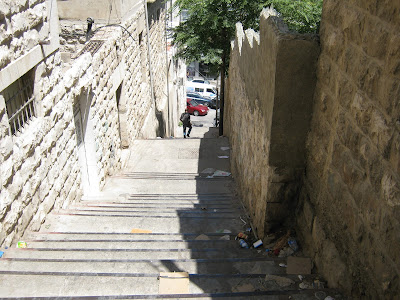That last day in Jordan and I was headed back to the
hotel. A woman sat on the sidewalk with
a bundle hidden in her abaya – maybe a baby. She was dirty and held out her
grimy hand and pleaded with her eyes, saying something in Arabic which I couldn’t
understand.
I walked on. Ignore
them, I had been advised.
One young Jordanian teacher told us that the woman and
the dirty boy and raggedy man and the laden donkey digging through the trash
bins – "that’s their job." Huh? "That’s
their job, they recycle stuff."
And about
another woman in clean clothes who clutched a nice-looking handbag and a baby, "she’s got
money, look at her purse."
So I walked on. It wasn’t my job to support these people. Wasn’t the US
spending enough money in the Middle East, why weren’t
these people being taken care of. Blah blah blah.
But then something clicked in - الحمد لله
I went back and did the right thing.
I went back and did the right thing.






















































